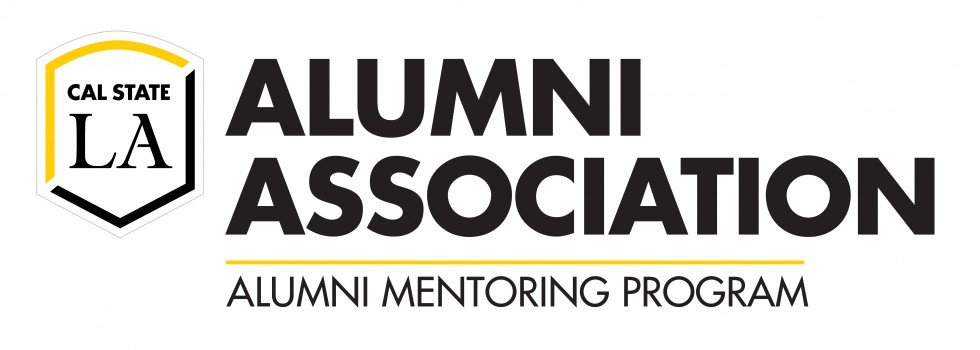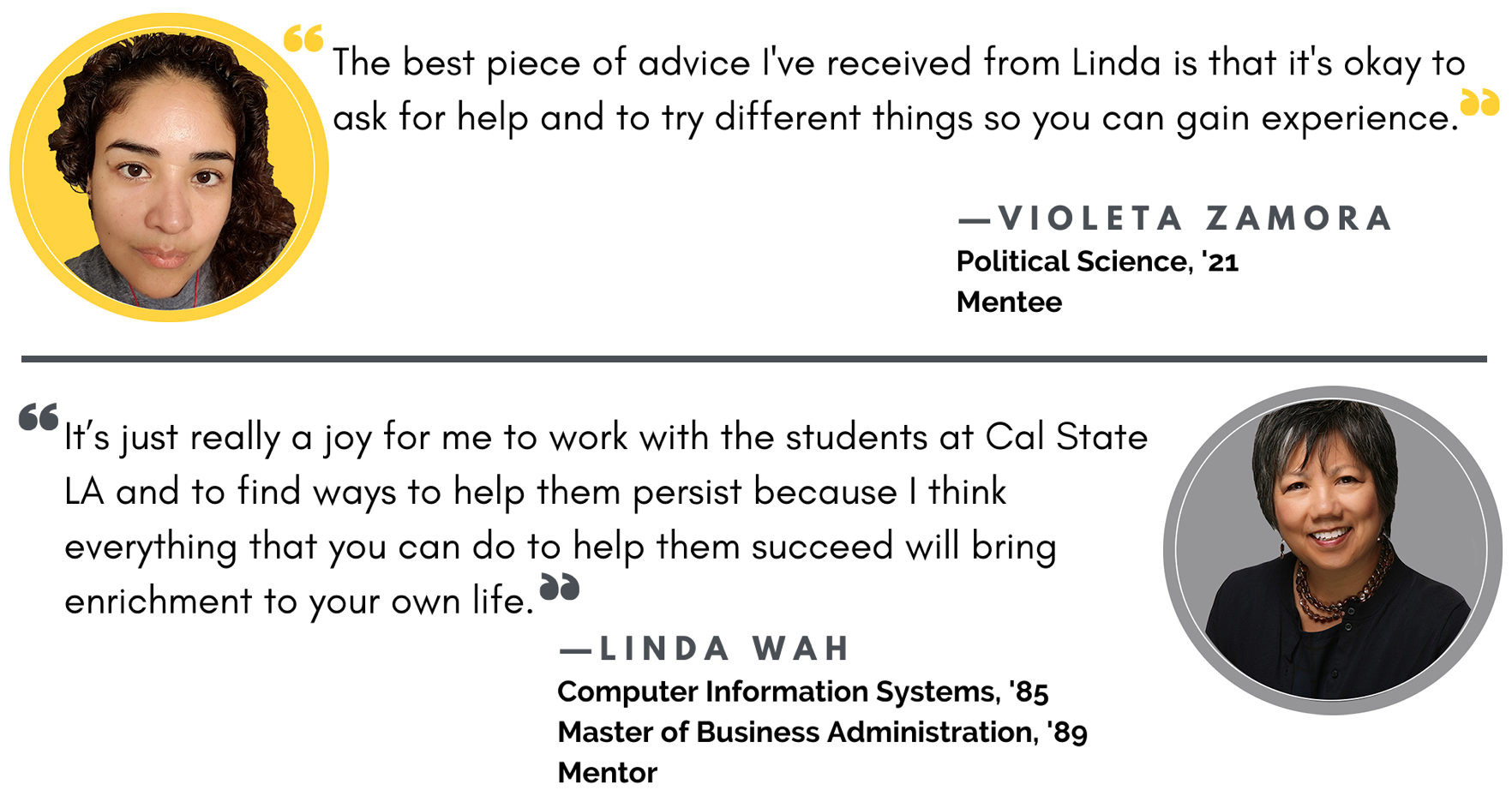Traditional Mentoring, our more structured form of mentoring, is another component we offer through the Alumni Mentoring Program. Spanning from October to May, the program allows mentors and mentees to work together towards a mentee’s career goals. We chatted with Linda Wah ('85, '89) and Violeta Zamora ('21), participants in the current 2020-21 cycle, about their experiences thus far.
What made you decide to join the Alumni Mentoring Program?
VIOLETA: I decided to join the Alumni Mentoring Program to try out what the program consisted of and see what type of experience would come out of it. It sounded like it was something interesting from their website and the email I received.
Is this your first time having a mentor?
V: Yes, this is definitely my first time having a mentor. It was something that I wanted to experience and learn from.
Is it what you expected?
V: I don’t know if I came in with expectations. I was more excited to see what connection I was going to make. And it actually came out to have really good results in the sense of being connected with Ms. Wah. It's been great. It’s been an experience to get to know her and to know about her career, and know her as a person as well. It’s been really good. I’m very grateful and excited to see where it continues to go because it’s been, up to now, really exciting and a learning experience as well.
What’s the best piece of advice you’ve received from your mentor so far?
V: I believe Linda told me that it is—kind of they go hand-in-hand these two things— it’s okay to be able to ask for help. And then secondly, to try different things so you can gain experience. I think that those two things really stuck out for me. Learning how to ask for help and getting to know people through networking, connecting, as well as how to expand new experiences and try different things and see where they take you.
Mentoring is a new concept to a lot of students. What would you say to a student who’s interested in becoming a mentee but is unsure of where to start?
V: I definitely like how Cal State LA has set it up with the information they provide. It comes across—and it is—very personable in the sense that you can choose and look and see what you’re interested in. I think I just got lucky because with Ms. Wah, she’s definitely someone that, with what I’m going to school for and her background, it’s a really good connection and I’m so grateful for that. It was on target. It was on point! So, I’m very lucky about that. But I think that if a student is concerned about it they can just reach out and give it a try. That would be my first suggestion. Just give it a try and see where it goes. I think it’s great that the Alumni Mentoring Program offers the opportunity to look at other options if there’s not something that’s also fitting, which I think is good because then it allows the student to understand what they really are looking for or what they want, and I think that’s a great option to have.
You’ve been a huge supporter of the mentoring program since 2008. Why is mentorship important to you?
LINDA: Well, I’ve been a longtime supporter of mentoring for anyone to get ahead. Mentoring and internships have been two of the biggest focuses I’ve had in education for all of our students. I firmly believe that our students are not just going to the university to get a college degree just to have a piece of paper in their hand. They believe that that’s the key for them to better their lives, to have a chance at better career opportunities. It opens doors for them. When Gary Matus ('69), one of my fellow members on the president’s community council, was on the Alumni Association Board he really pressed for Cal State LA to implement a mentoring program similar to UCLA’s, and I also supported that. We had a chance to come back and revive it when President Covino came to Cal State LA; he was very interested in doing this, but he wanted to make sure it got done right. We do think it’s going to help our students tremendously. Students like Violeta were just so anxious to hear how this will help propel them to achieve their goals.
Did you have a mentor when you attended Cal State LA?
L: I’ve had many mentors throughout my life. I was a returning student; I took time out to have a family and then came to Cal State LA and went into information systems. There were not many women in that field and you could not actually get a job unless you had prior experience, and, of course, there’s no way to get prior experience if no one will let you in the door, then, you know, you’re just kind of stuck. We had a professor at Cal State who built a relationship with the City of LA and built these internships. So, he mentored many of the students. There were almost 500 students who came through Cal State LA into the City of LA and had a chance to build a career through there. Certainly, Professor Lin, who was the initiator of that program, was a huge power for all of us who were in those internships. But throughout my time, I had many mentors in the City of LA. I was fortunate. People wanted to mentor me. But you know, one thing I would say is, you should not be afraid to reach out and ask people to mentor you. People sometimes are afraid or they’re waiting for someone else to ask them, you know, would you like me to be a mentor. I think you need to take that initiative yourself and ask people to help you. And you don’t have to say, “Will you be my mentor?” but just even asking people for advice and then they naturally become your mentors. And that helps you network and will help you throughout your life.
Because you’ve had so many mentees over the years, what’s something you’ve learned from them?
L: I learn a lot from mentees. I always tell people you can mentor up, you can mentor down. I have taken advice from people who are maybe my subordinates or people who are not in the same level of position I’m in. I find that you can get great advice from a lot of people. One of the things I learned early on is people shy away from things like trigger words - “Are you very political?” or “You’re being too political,” but really, networking is something that’s necessary. Networking is just building relationships and that’s what politics is, too. It’s being able to get things done based on your relationships. And those are things I have said to Violeta. Don’t shy away from those kinds of things and don’t let those trigger words stop you. Your success is going to be built on relationships and the friendships that you build now and in the future. One of the things, in working with Violeta, that I think really underscores some things that I think are important is we have to remember how many barriers our students have to really face as they’re trying to achieve their goals. And I think, in today’s environment, we see so many of our students that are really facing barriers that maybe we didn’t have to face 30, 40 years ago when we were getting our degrees. I think just kudos to those students who are really persevering and persisting because they’re really, really doing a lot of work and they’re doing really good work to get ahead and to get to their goals. Hats off to Violeta for great work that you are doing and your own persistence. These are things I learned from the mentees and I learned throughout the mentoring program is how important it is to recognize the challenges our students have to face and to be empathic about that.
What’s the best advice you can give to an alum who’s interested in becoming a mentor but unsure of where to start?
L: Just like Violeta would give her advice to her colleagues, I would say just jump in. I will say that to anyone who’s considering mentoring. I think you just need to jump in and extend your hand and be helpful. So much as I was fortunate to have people look back and to extend their hand to me to pull me up through the ladder and to help me, I think that it’s my responsibility to do the same. And I will tell you it’s such a rewarding experience to be able to work with the mentees that we’ve had. It’s just really a joy for me to work with both the students at Cal State LA, with the students at Pasadena City College and to find ways to help them persist because I think everything that you can do to help them succeed will bring enrichment to your own life.
This interview has been edited for length and clarity.
For the previous article, click here. For the next article, click here.

